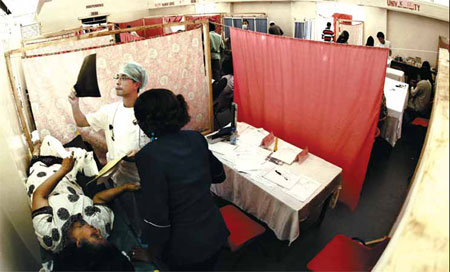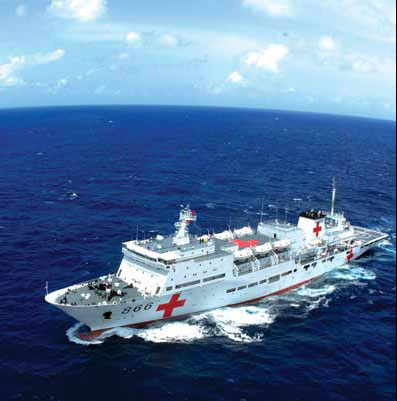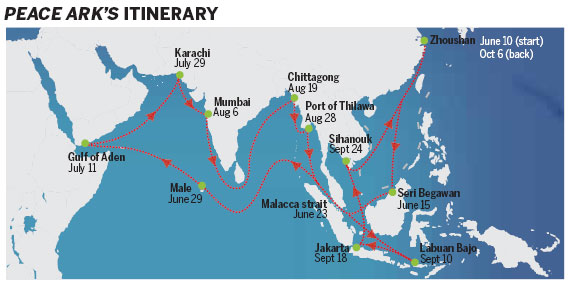From China with love and care
Updated: 2013-06-19 07:49
By Peng Yining (China Daily)
|
||||||||
|
Doctors from the Peace Ark perform surgery on local residents at a temporary clinic in Mombasa during the hospital ship's first mission in 2010. Photos by Ju Zhenhua / for China Daily |
|
Peace Ark is on a 118-day medical mission overseas. |
China Daily reporter Peng Yining is on board the hospital ship Peace Ark and will bring us regular reports throughout its 118-day aid voyage.
This is Liu Baichen's third ocean voyage. The 48-year-old ophthalmologist is again traveling with Chinese hospital ship No 866, nicknamed Peace Ark, on a four-month medical mission overseas.
On a previous Peace Ark mission to Djibouti in 2010, Liu cured a man from the slums who had lost his sight to cataracts. When Liu removed the bandages from the patient's eyes after the operation, the 53-year-old man jumped up from his bed and hugged him.
"For three years, he had been living in darkness, but suddenly he could see again," said Liu. "I couldn't understand his language but I could see the excitement in his face and eyes. The joy of being healthy is universal."
Liu said regaining his sight meant the patient was no longer a burden on his poverty-stricken family and he was able to start a new life.
"As a doctor, I felt so proud to see him smile," said Liu, who has been an ophthalmologist at the General Hospital of the Chinese Navy in Beijing for 23 years. "I have been working in China for a long time, and now I am able to help people in other countries."
At the sound of a steam whistle, Peace Ark, a 178-meter-long white vessel with red crosses painted on her decks and sides, sailed from the port of Zhoushan in East China's Zhejiang province on June 10. During the voyage, she will visit eight countries, including Indonesia, Pakistan and India, providing free medical services to the local population.
Responsibility and capability
"As the world's second-largest economy, China has the responsibility and the capability to provide humanitarian services to people across the world," said Guo Fenghai, professor of Marxism studies at the PLA National Defense University. "In the era of globalization, international cooperation has played an important role in China's development, and, in return, the world should also benefit from China's growth."
During her first two missions, in 2010 and 2011, the Peace Ark visited nine countries in Southern Asia, Africa and South America, providing medical services to more than 23,000 people, 215 operations have been performed.
Liu said he conducted 81 operations on those two missions. At the peak, more than 50 patients consulted him every day.
The surgery isn't cheap. Liu said a regular cataract operation costs at least 6,000 yuan ($980) in China, although the cost varies from country to country. On previous voyages, many patients consulted him aboard the Peace Ark, either because they couldn't afford the treatment or would have to wait as long as a year to undergo surgery at a local hospital because medical resources were so scarce.
"But more importantly, they trusted the Chinese doctors," Liu said. "The world has witnessed China's development, and people understand that Chinese medical technology has developed as well."
During the 2010 mission, the ship's medical staff helped to deliver a baby girl to a woman with acute heart disease.
Lu Jianguo, a naval officer, said: "That was a close call. Both mother and baby were at their last gasp when they came to our hospital ship. The baby's father burst into tears when he held his child."
Lu said he now fully understands how that man felt, because his son was born just one month before the ship sailed from Zhoushan.
"He was so small and vulnerable when I held him in my arms for the first time. Suddenly he kicked a little. I will never forget that moment. It was the first time I felt that I was really a father."
However, he has now bid his family farewell and joined the four-month voyage. "It wasn't an easy decision. I feel sorry for my wife and my son," said Lu. "But if my mission makes people overseas feel as healthy and happy as I do with my family, then it will be worth being apart for four months."
With fair breezes and smooth seas into the tropics, the Peace Ark sailed south. As the voyage progressed, the soft, sweet tropical air mingled with the fresh smell of the sea and gave the crew of more than 400 soldiers, sailors, officers and medical staff a delightful experience of ocean travel.
On Saturday, the ship arrived at its first port of call in Brunei, where the crew participated in a joint humanitarian drill held by the Association of Southeast Asian Nations Defense Ministers' Meeting Plus. It was the first time the ship had participated in a large-scale joint drill with ASEAN.
Before each mission, the Peace Ark asks the local authorities for permission to treat residents and pledges to respect the local culture and religion, according to Wang Zhihui, director of the mission's medical crew. Every medical procedure is carried out with the patient's consent.
Wang said China has sent medical experts to all the countries the Peace Ark will visit to conduct research into local health care needs. He used cataracts as an example, saying the condition is a common problem in the tropics because of the prevalence of strong ultraviolet rays.
The Peace Ark's ophthalmology team is one of the best in its field and its equipment is state of the art.
"You have to know what people need in order to help them," he said. "We were warmly welcomed on the first two missions. The lines of people stretched longer than a kilometer and some even waited the entire night to see our doctor."
As the hospital ship only anchors at each stop for several days, the medical team targets common diseases and operations that can be completed quickly.
The services, including surgery and medication, are free of charge and in line with international standards, said Wang. "We have the most experienced doctors and the best medicines," he said.
Zhang Lanmei, a 50-year-old gynecologist, said this is her first Peace Ark mission.
"I have been working for more than 30 years and I am happy that my experience will help people overseas," she said.
Purpose-built vessel
Designed and constructed in China, the Peace Ark is a purpose-built hospital vessel and much of its equipment is of the same standard as that found in some of China's top hospitals. The vessel has 300 sickbeds, eight operating rooms and a rescue helicopter.
Wang said the crew includes three experts in traditional Chinese medicine, who provide treatments such as acupuncture and massage.
"Chinese medicine is widely accepted in Southern Asian countries. Our trip is also a great opportunity for people to learn more about our culture and history," said Wang. "During the visit, the ship will be totally open to local medical professionals. We are looking forward to learning from them as well."
On the walls of one sickroom, posters explain Chinese medicine and treatment. A doctor stabbed a thin needle into an officer's back to ease his backache. Through the porthole behind the doctor, seagulls could be glimpsed as they glided by. Even during heavy gales and swells, the sickrooms are quiet and dry.
"Showing goodwill to neighboring countries is a responsibility and also a sign of a confident country," said Guo from the PLA National Defense University.
He said China has a tradition of spreading friendship across the seas, referring to the voyages of Zheng He, a politician and navigator during the Ming Dynasty (1368-1644). Zheng led 100 vessels and more than 27,000 officials and soldiers on visits to more than 30 countries and regions in Southern Asia and East Africa during seven voyages in a 28-year period between 1405 and 1433. Zheng's voyages were a landmark in the history of navigation and a remarkable chapter in the diplomatic activities of ancient China.
"The Peace Ark's voyage can also be seen as a diplomatic trip, one that could help China build its international image. China and the countries the ship visits can all benefit from this trip," said Guo.
"Other nations, including the United States, also send their hospital ships overseas to provide humanitarian services."
Chen Xianguo, senior captain of the Peace Ark, described the vessel as a "lifesaving ship. Our voyage is a trip to make friends. It sends a friendly message to countries across the seas, and it's also an opportunity for them to get to know China and her navy."
Contact the writer at pengyining@chinadaily.com.cn
Ju Zhenhua, Tang Yue and Zhang Yuchen contributed to this story.
|
Source: Peace Ark Feng Xiuxia / China Daily |
(China Daily USA 06/19/2013 page8)

 Michelle lays roses at site along Berlin Wall
Michelle lays roses at site along Berlin Wall
 Historic space lecture in Tiangong-1 commences
Historic space lecture in Tiangong-1 commences
 'Sopranos' Star James Gandolfini dead at 51
'Sopranos' Star James Gandolfini dead at 51
 UN: Number of refugees hits 18-year high
UN: Number of refugees hits 18-year high
 Slide: Jet exercises from aircraft carrier
Slide: Jet exercises from aircraft carrier
 Talks establish fishery hotline
Talks establish fishery hotline
 Foreign buyers eye Chinese drones
Foreign buyers eye Chinese drones
 UN chief hails China's peacekeepers
UN chief hails China's peacekeepers
Most Viewed
Editor's Picks

|

|

|

|

|

|
Today's Top News
Shenzhou X astronaut gives lecture today
US told to reassess duties on Chinese paper
Chinese seek greater share of satellite market
Russia rejects Obama's nuke cut proposal
US immigration bill sees Senate breakthrough
Brazilian cities revoke fare hikes
Moody's warns on China's local govt debt
Air quality in major cities drops in May
US Weekly

|

|










